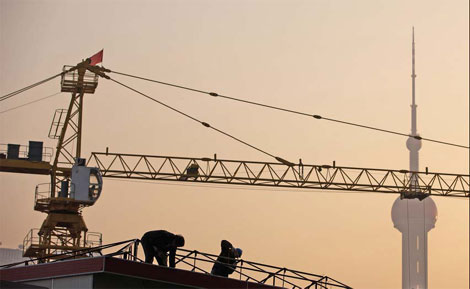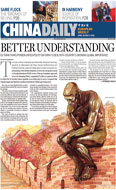No let-up in monetary policy tightening
Updated: 2011-04-22 10:03
By Zhong Nan (China Daily European Weekly)
 |
|
Infrastructure construction and imported inflation have significantly contributed to the domestic price rises, experts say. Xu Xiaolin / For China Daily |
Inflation risks pose tough challenges to policymakers
China will continue to tighten its monetary policy to check inflation in the second quarter of this year, economists say.
The consumer price index (CPI), a main gauge of inflation, rose 5.4 percent year-on-year in March, according to the National Bureau of Statistics. The growth rate is the fastest since July 2008.
"Infrastructure construction and imported inflation have significantly contributed to the domestic price rises," says Zhao Zhongxiu, professor of economics at University of International Business and Economics in Beijing.
"China's massive investments on railway construction, energy development and building projects have triggered new inflation of domestic commodities. Policymakers must take effective measure to slow down the constructive speed of these projects nationwide in the second quarter."
Investment also rose as the country's urbanization accelerated. Urban fixed-asset investment increased 25 percent to nearly 3.95 trillion yuan (420 billion euros), accounting for 44.1 percent in the first quarter gross domestic product (GDP).
Zhao believes widespread inflation in emerging economies, unstable international environment and abundant liquidity globally all produced an inflationary impact on the Chinese economy in the past three months.
Prices of crude oil, iron ore and grains rocketed to the highest level in two years in March. Food prices, which account for around one-third of the CPI basket, surged 11 percent from a year earlier, while housing costs jumped 6.5 percent year-on-year.
Jing Ulrich, chairman of global markets (China) at JPMorgan, says domestic and international food price volatility constitutes the main risk to the inflation outlook for the remainder of the year, as prices of agricultural produce are prone to surges in the event of adverse weather conditions.
"Inflation is likely to peak by mid-year, before moderating in the second half," Ulrich says in a research note.
Continuing wage inflation and policy-mandated rises in fuel prices and electricity tariffs should exert upward pressure on prices at the producer level, she says.
China's GDP expanded 9.7 percent in first quarter of 2011 from a year earlier to 9.63 trillion yuan.
In the fourth quarter of 2010, the economy grew 9.8 percent year-on-year from 9.6 percent in the third quarter, after slowing from 11.9 percent in the first quarter and 10.3 percent in the second.
"The March data confirmed that China's economy is still overheating and the inflation risk is still very much on the upside," says Wei Yao, China economist from Societe Generale SA's global research and strategy unit.
The 25-percent growth in fixed-asset investment indicates continued strong investment from local governments, while the growth of central government-approved projects declined to the lowest level since 2005, Wei says.
He Jingtong, a professor at the Institute of Economics of Nankai University in Tianjin, says raising the interest rate will definitely cause an inflow of speculative foreign money into the mainland through Hong Kong and foreign corporations and banks in the mainland, which could initiate a new round of investment wave and inflation in China.
"In comparison with hiking the interest rate, raising the reserve requirement ratio is more practical and safer to curb the inflation," he says.
To mop up the excessive liquidity that can stimulate inflation, the country's central bank has raised the reserve requirement ratio for commercial banks 10 times since the beginning of 2010.
"Emerging markets will continue to face inflationary pressures if developed economies do not halt their quantitative easing policies," says Guo Tianyong, a professor with the Central University of Finance and Economics.
"Monetary polices have limited effects in curbing consumer prices, but they are necessary in managing inflation expectations and preventing hyper-inflation."
Despite the heightened cooling measures, domestic money supply remained abundant, as the central bank announced recently that the broad money supply, which covers cash in circulation and all deposits, increased 16.6 percent year-on-year in the first quarter of 2011, up 0.9 percentage points from February.
China's foreign exchange reserves surged to $3 trillion (2.1 trillion euros) by the end of March and Chinese banks lent 679.4 billion yuan of loans in March, up from 535.6 billion yuan in February, says a statement from the People's Bank of China.
The central bank raised the required reserve ratio for lenders from April 21 by 50 basis points, in its latest effort to curb the stubbornly high inflation.
The move will raise the required reserve ratio for China's large financial institutions to a record high of 20.5 percent, which means they have to lock up 20.5 percent of their deposits as reserves.
Sun Chi, an analyst with Nomura Securities, says inflation pressure would persist for a period of time, an indication that the monetary tightening circle is still in its early days.
"We expect interest rates to be lifted by another 75 basis points this year, while the reserve requirement ratio will go up by another 100 basis points," he says.
But Sun warns that the government should be cautious of anti-inflation measures as they could put a sudden brake on the fixed-asset investment and might lead to a "hard landing".
E-paper

Head on
Chinese household care goods producers eye big cities, once stronghold of multinational players
Carving out a spot
Back onto center stage
The Chinese recipe
Specials

British Royal Wedding
Full coverage of the royal wedding of Prince William and Kate Middleton in London. Best wishes

The final frontier
Xinjiang is a mysterious land of extremes that never falls to fascinate.

Bridging the gap
Tsinghua University attracts a cohort of foreign students wanting to come to China.
